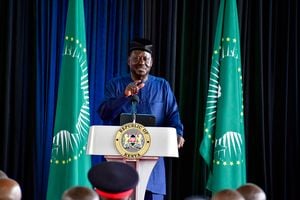
Mr Raila Odinga at the African Union Headquarters in Addis Ababa for the African Union Chairmanship Debate on December 13, 2024.
Orange Democratic Movement (ODM) leader Raila Odinga’s performance in the African Union Chairperson debate against two rivals on Friday did little to bridge the differences between supporters and those opposed to his candidature.
Mr Odinga’s campaign team believes he won the AU Commission debate “hands down”, with Prof Makau Mutua – one of those on the team – saying Mr Odinga would be ready to work for the continent on Day One.
“Bravo Raila Odinga. Formidable debate and show of leadership for Africa,” Prime Cabinet Secretary Musalia Mudavadi said.
Foreign Affairs Principal Secretary Korir Sing’oei said the AU Commission needs a leader who can mobilise Africa’s unity of purpose, necessary to unlock the potential of the continent’s vast natural endowments and human capital.
“Raila Odinga offers unmatched experience and statesmanship to chair the AU Commission,” he said.
The statements of the PS were echoed by political strategist Pauline Njoroge, who is also in Mr Odinga’s campaign panel.
“What the AU Commission needs is a statesman and a visionary, not a just bureaucrat who will not inspire, and has no clout to unite, mediate and even mobilise heads of state and key stakeholders to action. Raila Odinga has proved to be the man for the job,” Ms Njoroge said.
The debate, televised between 7pm and 9pm, tackled economic integration, peace and security, the continent’s place in the international economy and reforming the AU.
Kisumu Governor Anyang' Nyong’o – the man entrusted to steer the ODM in Mr Odinga’s absence – said the former Prime Minister “answered questions with calmness and a sense of purpose”.
Prof Nyong’o added that he had talked to his academic colleagues in many parts of the continent who watched the debate “and the verdict seems unanimously clear – Raila Odinga performed much better than the other candidates who also did their best”.
The other contestants for the seat are Djibouti Foreign Minister Mahmoud Ali Youssouf and former Madagascar Foreign Affairs Minister Richard James Randriamandrato.
According to Director-General of the Ministry of Trade and Tourism of breakaway Somaliland Abdirashid Ibrahim, Mr Odinga delivered a “commanding performance during Mjadala Afrika, showcasing world-class insight and unparalleled technical acumen”.
Mr Odinga addressed governance, security and economic integration challenges while charting a vision for the continent, Mr Ibrahim said, adding his emphasis on youth empowerment, climate action and the AU demonstrated a deep understanding of the needs of the continent.
“He outlined a transformative strategy to shift Africa from exporting raw materials to becoming a manufacturing hub. This includes fostering intra-African trade, building logistical hubs and advocating for fair global financial systems to unlock sustainable growth,” he added.
Former Mukurweini MP Kabando wa Kabando viewed the debate differently.
“I have voted for Raila Odinga to be president of Kenya two times, vigorously in 2022 and discreetly in 2017. I cast my first vote for president for Jaramogi Oginga in 1992. Today, I pray that Raila loses,” he said on social media ahead of the debate.
Mr Odinga arrived in Addis Ababa, Ethiopia, on Wednesday ahead of Friday’s live debate in which he, Mr Youssouf and Mr Randriamandrato outlined their agenda.
He was accompanied by his staff and supporters, including Nairobi Governor Johnson Sakaja.
During the debate, Mr Odinga said he would demand that Africa gets two permanent seats with veto powers at the United Nations Security Council.
He criticised the current structure as outdated, saying the UN was established when most African nations were still colonies.
“Africa must get two permanent seats in the UN Security Council, permanent representation with veto powers is a must for Africa,” he said.
According to Mr Odinga, 93 per cent of the resolutions passed by the heads of the states at the AU are never implemented.
He, however, added that he is ready to work for the continent. Mr Odinga said reforms are necessary for the AU to realise its goals.
He added that if elected in February, he would ensure member states pay the dues owed to the African Union.









